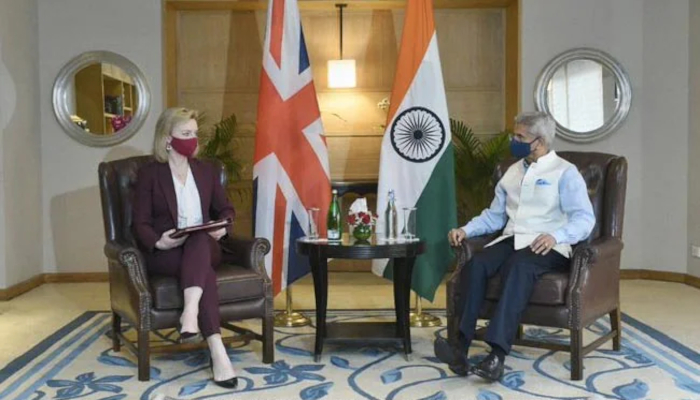India on Thursday defended its decision to look for “good deals” for its energy requirement amid volatility in the market, while pointing out that Europe has been a major buyer of Russian oil and gas even after the crisis in Ukraine unfolded.
External Affairs Minister S Jaishankar made the remarks in the presence of visiting British Foreign Secretary Liz Truss at the India-UK Strategic Futures Forum, shortly after holding extensive talks with her on a range of issues, including the situation in Ukraine.
“When the oil prices go up, I think it is natural for countries to go out into the market and look for what are the good deals for their people,” Jaishankar said.
“But I am pretty sure if we wait for two or three months and actually look at who are the big buyers of Russian oil and gas, I suspect the list would not be too different from what it used to be and I suspect we won’t be in the top 10 on that list,” he said.
Mr Jaishankar’s comments came on a day Russian Foreign Minister Sergey Lavrov arrived in India on a two-day visit.
The visit by Ms Truss to India on Thursday came amid increasing disquiet in the western capitals over India not criticising Russia for its attack on Ukraine and its decision to buy discounted Russian crude oil.
Severely critical of Moscow’s invasion of Ukraine, Ms Truss said at the India-UK forum that her country will end its dependence on Russian oil by the year-end and added that India is a sovereign nation and she is not going to tell it what to do.
She was asked at the forum to comment on India’s decision to buy discounted oil from Russia.
“It is interesting because we have seen for some time what looks almost like a campaign on this issue. I was reading a report today that in March, Europe has bought, I think, 15 per cent more oil and gas from Russia than it did the month before,” Mr Jaishankar responded.
“If you look at the major buyers of oil and gas from Russia, I think you will find most of them are in Europe,” he added.
Mr Jaishankar said India gets the bulk of its energy supplies from the Middle East and around 7.5 to 8 per cent from the US, while the procurement from Russia in the past was less than one per cent.
“We are reducing and eliminating our dependence on Russian oil and gas. That takes time. That is also true for other countries and the important thing for me is that the G7 has set a timetable to end that dependency and sent a strong signal in the market,” Truss said.
“There have been some pretty remarkable changes. Germany has changed its entire energy and defence policy as a result of the invasion of Ukraine. We need to keep doing that,” she said.
Truss said sanctions against Russia must be enforced. “We need to continue to put pressure on (Vladimir) Putin and continue to supply weapons to Ukraine.” The British foreign secretary said strengthening her country’s relationship with India has become more important than it was before as “we are living in a more insecure world, precisely because we have Putin’s appalling invasion of Ukraine and violation of its sovereignty and territorial integrity”.
She wondered what would be the message the democratic countries will send across the world if the Russian president was successful.

